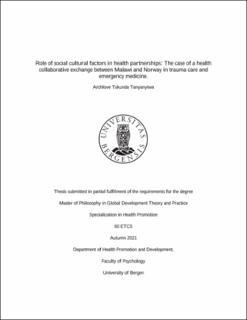| dc.description.abstract | Health partnerships are increasingly becoming a global phenomenon in many areas of care. One such an area is in the trauma care and emergency medicine. There are high risks of trauma and emergency care related permanent injuries, disabilities, and death mostly in Sub Saharan Africa including Malawi while the isolated cases are on the rise in the Global North countries including Norway. A call for diverse and competent health professionals is at the center of global action on trauma and emergency medicine capacity development. Partnerships in global health and development are widely recommended as a vehicle to achieve health equity if universally implemented. Drawing from this background, the Norwegian Agency for Exchange Corporation (NOREC) leads a collaborative exchange of health professionals between Haukeland Hospital (HUH) and Malawi’s Kamuzu Central Hospital (KCH). This is one of many partnerships currently existing between Norway and Malawi in their quest to compliment global efforts on partnerships for health and sustainable development. Social and cultural differences and competences within health partnerships affect partnership processes in achieving positive outcomes. As such, the study aimed at exploring the social and cultural experiences of healthcare professionals in the NOREC exchange partnership between Malawi and Norway, particularly investigating on how these experiences affected the exchange program and shaped participants cultural competences. The Cultural Competence Model in health partnerships and the Bergen Model for Collaborative Functioning (BMCF), were used as analytical frameworks for the study. A qualitative case study design was used with semi-structured online interviews and policy documents used as methods for data collection. A total of 12 interviews were conducted. Findings show that the participants were motivated to participate in the partnership because of their early involvement in the planning phase of the partnership, and that the partnership had clear goals. Additionally benefits for participating were also reported as motivating factors both at individual and institutional levels. It was also found that the partnership was well resourced, and this encouraged participation and helped the partnership to make significant progress towards its goals. Health professionals also reported varied social and cultural experiences, and these were encountered around issues do with communication, leadership, interactions with patients, role of families in patient care, and with co-workers in host institutions and contexts. Cultural competence was built by experiencing the differences in the partnership environment and more specific socio-cultural interpretations and differences in the culture of work. Individual participants expressed concern over their need to feel safe and connected within the partnership setting and the conditions that come with it. Social and cultural experiences of participants impacted on the partnership outcomes although not foreseen in the primary goal of the collaboration between Malawi and Norway. Cultural competence is both an input and an output of partnership functioning. Themes around belongingness, safety, connection and the required cultural competence in health partnerships were raised and present an opportunity to further our understanding of partnerships in development practice, health promotion and also in further development of research work in this area. | |
